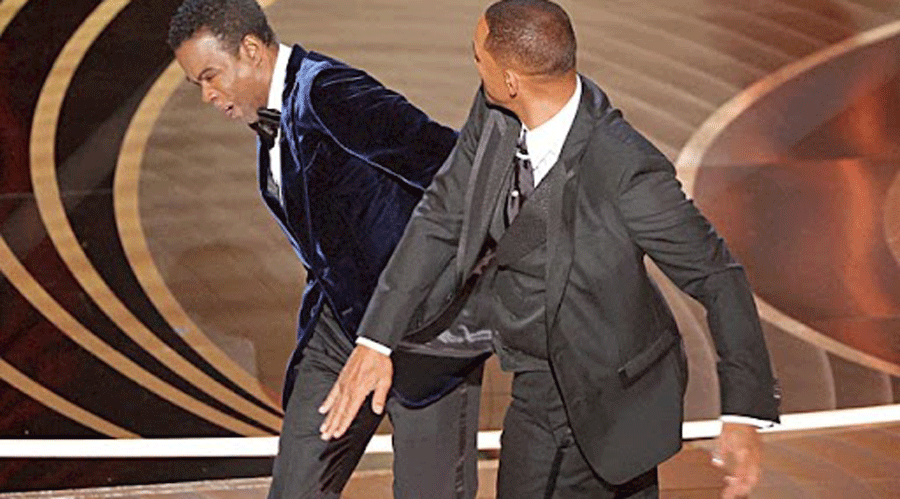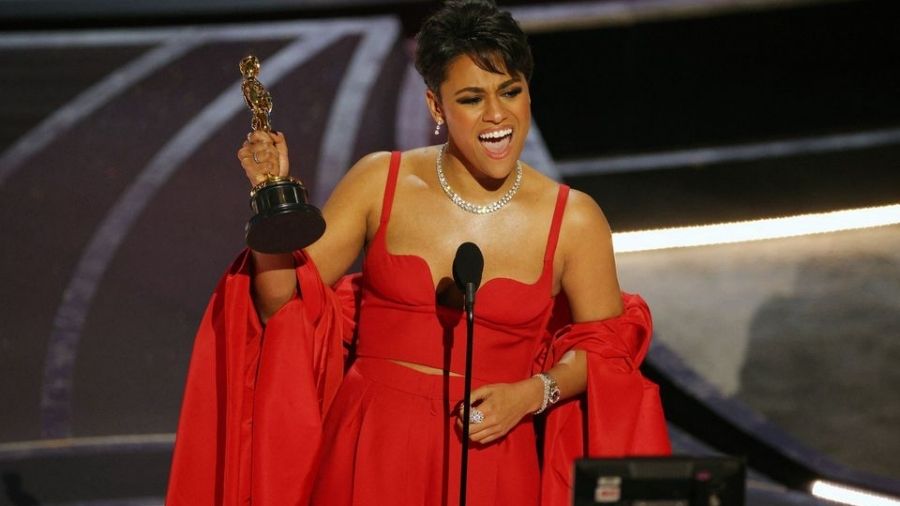In an Academy Awards ceremony where an onstage altercation between Will Smith and Chris Rock overshadowed the honours, CODA from Apple TV+ won the Oscar for best picture, becoming the first film from a streaming service to be welcomed into that rarefied Hollywood club.
The 94th Academy Awards on Sunday had a freewheeling, irreverent tone from their start, with ABC and the Academy of Motion Picture Arts and Sciences labouring to prove that the Oscars could be lively and culturally relevant. By the ceremony’s end, it was certainly a night for the Hollywood ages.
An emotional Smith won the best actor Oscar for his performance in King Richard as the fiery, flawed coach and father of tennis legends Venus and Serena Williams. Moments earlier, the ceremony had been derailed when Smith strode onstage from his seat and — in what at first seemed like it could be a pre-planned bit — slapped Rock, who had just cracked a joke about Smith’s wife, Jada Pinkett Smith.
“Jada, I love you. G.I. Jane 2, can’t wait,” Rock said, a reference to her shaved head. She had revealed her alopecia diagnosis in 2018. Demi Moore famously shaved her head to star in the 1997 film G.I. Jane.
After the altercation, Smith returned to his seat and angrily shouted twice at Rock to “keep my wife’s name out of your” mouth, using an expletive that was bleeped by ABC. Rock tried to regain his composure, and a stunned audience, both in the theatre and at home, tried to figure out what had happened.
Rock recovered enough to present the best documentary award to Summer of Soul. But even an emotional acceptance speech by the film’s director, Ahmir “Questlove” Thompson, could not hide the fact that many in attendance were rattled.
It was Smith’s first Oscar. He was previously nominated for best actor in 2007 for The Pursuit of Happyness and in 2002 for Ali.
“Richard Williams was a fierce defender of his family,” Smith said in accepting the award, a clear reference to what had just taken place. “Art imitates life.”
With tears running down his face, he also apologised to the academy and his fellow nominees. But not to Rock. “I hope the academy invites me back,” Smith said.
“To do what we do, you have to be able to take abuse, people talk crazy about you,” Smith said. “In this business, you’ve got people disrespecting you. Have to smile and pretend it’s OK.”
CODA, a dramedy about the only hearing child of a deaf family, beat a rival streaming-service film, The Power of the Dog from Netflix, for the top prize. For an industry in turmoil, with tech giants like Apple and Amazon upending entertainment-industry business practices and threatening Hollywood power hierarchies, the win by Apple TV+ was a seismic moment.
Television and film have been merging for years, but lines of demarcation remain, with the Oscars as one.
Patrick Wachsberger, a CODA producer, thanked Apple from the stage for backing the low-budget film, noting that the company was “able to basically put this everywhere in the world”.
In an important step for representation in Hollywood, Troy Kotsur became the first deaf man in academy history to win an Oscar for acting. Voters honoured his heart-tugging supporting performance in CODA as a fisherman struggling to relate to his hearing daughter.
Until Sunday night, Kotsur’s CODA co-star Marlee Matlin was the only deaf person to win an acting Oscar. She received her gold-plated best actress statuette in 1987 for Children of a Lesser God.
“I cannot believe I’m here,” Kotsur said, speaking energetically via a sign-language interpreter. He dedicated his win to the deaf and disabled communities. “This is our moment.”
The best actress Oscar was awarded to Jessica Chastain for The Eyes of Tammy Faye. It was her first Oscar, having previously been nominated in 2013 for Zero Dark Thirty and in 2012 for The Help.
During her speech, Chastain spoke about suicide, “bigoted legislation” being enacted across the country and hate crimes around the world.
“In these moments, I think about Tammy Faye and her radical acts of love,” Chastain said. “I see it as a guiding principle that leads us forward. Anyone who feels hopeless and alone, know that you are unconditionally loved for the uniqueness that is you.”
It was a humiliating night for Netflix, which has poured wheelbarrows of cash into Oscar campaigns over the last few years. Netflix had a leading 27 nominations going into the ceremony. It left with one win, for Jane Campion’s direction of The Power of the Dog. Campion became only the third woman to win in the directing category.
Although streaming services like Apple TV+ and Netflix drew the most nominations, old-fashioned theatrical movies dominated much of the ceremony. The big-budget, science-fiction blockbuster Dune won six Oscars, including one for Greig Fraser’s cinematography.
Encanto, released exclusively in theatres before moving to Disney+, was named best animated film. Dune, a remake from Warner Bros and Legendary Entertainment, pushed aside the Netflix western The Power of the Dog, which had been favoured to win the cinematography prize.
Ariana DeBose took home the best supporting Oscar for her role as Anita in Steven Spielberg’s West Side Story.
New York Times News Service











